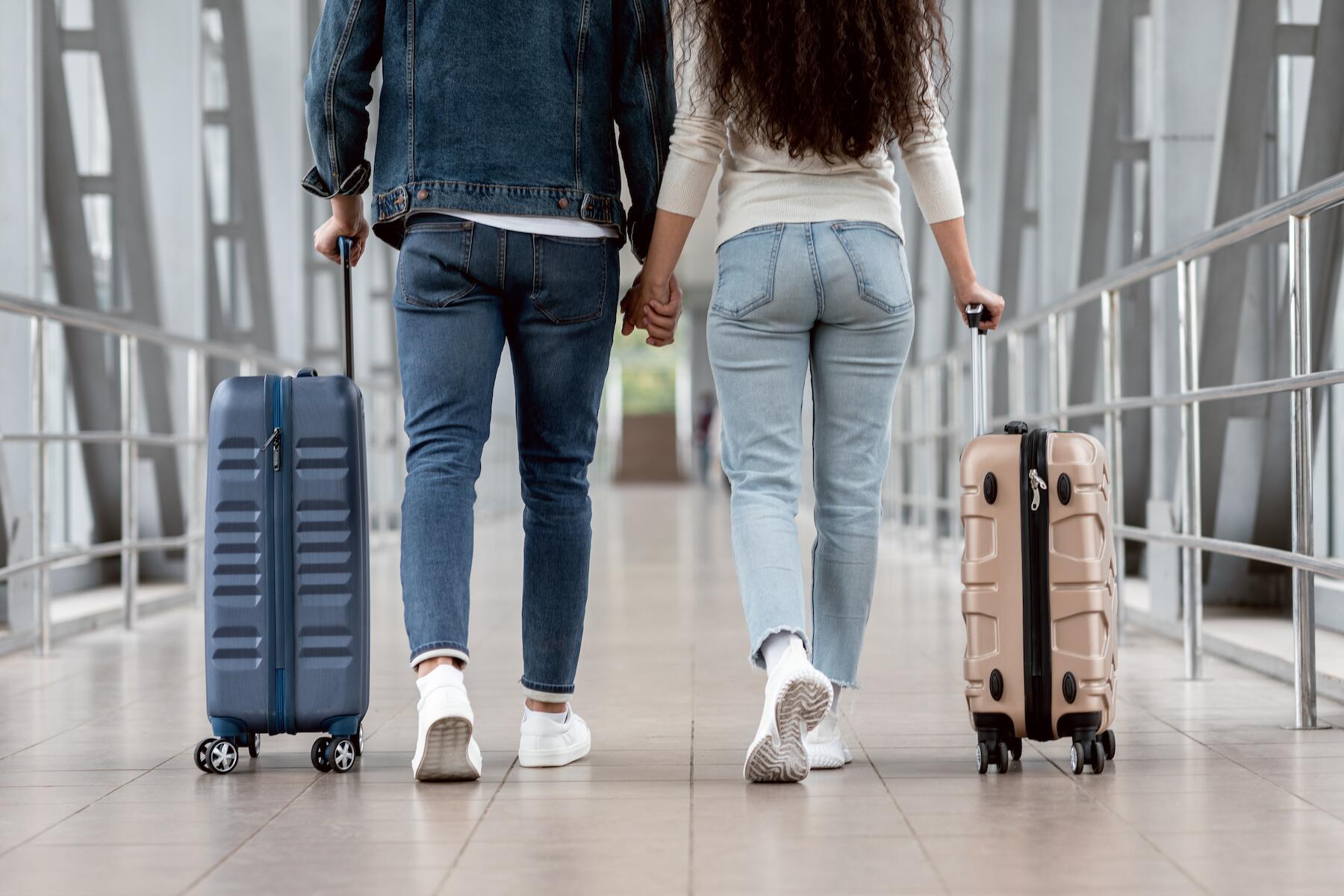With these expert tips, visiting your significant other’s relatives during the holiday season doesn’t have to be stressful.
Spending time with your partner’s kin can be taxing, whether you’re meeting them for the first or tenth time, and especially if you’re traveling during the busy holiday season amidst labor shortages and a looming virus. While getting out of town and bonding with your boo can lead to cherished memories, the idea of a long road trip or busy airport can make some anxious.
We consulted psychologists and travel experts for advice on how to reduce travel anxiety triggers and calm nerves when outside of your comfort zone. Read on for solutions around planning travel during the holiday season and keeping your cool if drama arises.
Plan Your Travel Dates Wisely
According to the Transportation Security Administration (TSA), the three busiest days to travel around Thanksgiving are the Tuesday and Wednesday prior to the holiday and the Sunday afterward. In 2019, the TSA screened approximately 2.9 million passengers the Sunday after Thanksgiving, the most recorded in a single day. TSA expects this year’s travel volume to be close to pre-pandemic levels.
Recommended Fodor’s Video
“Decide with your partner what is a must-do this year and what can be altered,” advises Dr. Bethany Cook, a licensed clinical psychologist. Perhaps you only visit family that you can drive to if expensive airfare is more than your budget or psyche can bear. Or celebrate holidays on different dates to snag cheaper rates on flights and hotels.
Give Yourselves Extra Time
“Believing that holiday travel will be stress-free is a setup for disappointment,” warns Dr. Jenny Yip, a licensed psychologist and executive director of the Renewed Freedom Center. “Anticipate delays, cancellations, a lot of traffic and people.”
Buffer schedules with added time for parking, shuttles, baggage, and security. Laura Lindsay, a Skyscanner travel trends expert, says arriving at the airport three hours before flights on peak travel dates is wise. She also recommends enrolling in Global Entry or TSA-Precheck, programs that enable prescreened passengers to be expedited through security at the airport. According to TSA, many new enrollees have received their known traveler numbers in as few as three to five days.
Develop a Game Plan
Agree in advance on how you’d like the trip to go. For example, if you’re departing on a long road trip with your partner, determine if you are the type of traveler who likes to stretch their legs and visit every outlet mall or if you prefer to get to the destination as quickly as possible, says Dr. Cook. Divvy up drive time in advance—for instance, each partner drives for two hours before swapping seats.
“Talk about whatever is causing you anxiety before the trip,” recommends Dr. Cook. “If it’s early in your relationship and you’re worried about passing gas, try to break the ice with a joke about when the first fart might come.”
Make Plans B, C, and D
List potential issues, such as missed connections or crowded roadways, and problem-solve ways to cope or prevent setbacks. “Identify the internal thoughts or external events that are prompting anxiety: what are you fearing?” advises Lisa Bahar, licensed marriage and family therapist. “Catastrophize the anxiety through to the end of what could happen, and develop a step-by-step plan of alternate options.”
“Back-up plans can help with the anxiety of cancellations and last-minute challenges so you don’t have to recreate the holiday from scratch,” says Don Cole, clinical director of The Gottman Institute, which provides resources for couples based on five decades of relationship research. “The most important thing is to focus on the well-being of all concerned rather than the loss of plans. Be gentle with each other in times like these.”
“Knowing in advance the agreed upon game plan not only decreases anxiety, but it also brings you and your partner closer when working as a team,” says Dr. Cook. Sounds like a win!
Pack Your Favorite Things
Don’t make this the time you decide to go without your preferred pillow, eye mask, or ear plugs, says Dr. Cook. Bahar suggests bringing along a favorite comfort object, such as a blanket. Wear soft, relaxed clothing for transit. You can always change before you get to your partner’s family gathering.
Download music, podcasts, movies, or books that you look forward to enjoying. “Your favorite content is a great escape from any travel or social anxiety you may be experiencing,” says Lindsay. “Pick something that is soothing and comforting to relieve any tension.” Make sure devices are charged and also bring non-electronic content like books and magazines in case batteries run out, or there isn’t Wi-Fi, advises Dr. Cook.
Don’t allow yourself to get “hangry.” Pack nutritious foods that you can eat in case of travel delays. Cole recommends packing essentials like medications in an easily-available bag.
Establish Signals for Defusing Stressful Situations
When you arrive at your destination, Bahar suggests checking in with each other frequently and not leaving your significant other to fend for themselves. Determine what topics should be avoided to keep the peace with extended family members, such as steering clear of parenting discussions with Aunt Betty.
Dr. Cook recommends coming up with different words, looks, or hand/body gestures that mean ”I’m cool” or ”save me.“ Agree to safe words or phrases if one of you is uncomfortable or would like to leave soon. Something inconspicuous such as “it is the little things,” can be a secret signal between the two of you, says Bahar.
Bahar suggests having a time-out plan, such as going to the bathroom or playing with children or animals. Dr. Yip says a phrase like, “I’m going to get some coffee,” can be a cue to your partner. They could then suggest a walk or talk to separate you from the source of distress. “Find a way to be one another’s ally,” says Cole. “Think of it as a gift to each other to help manage escalation.”
Focus On Gratitude
Thankfulness is an important part of the holiday season, and positive, appreciative thoughts can improve our well-being. While holiday travel can be stress-inducing, Bahar suggests finding the sparkling moments that did work, such as “the flight was smooth.” She also recommends complimenting others with added observations. For example, if the gate agent helps you change your seat or the hotel employee assists you with your luggage, say, “Thank you for taking the extra time to help me during an especially busy day.”
When with extended family, understand that there can be generational differences that affect expectations, belief systems, and values, says Dr. Yip, and try not to hear everything as criticism. “You can appreciate your partner’s family for giving you your significant other,” she says. “Without them, you wouldn’t have [them], and if you have children, your children as well.”
Realize You Are Not Alone
According to the American Psychiatric Association, anxiety disorders affect almost one out of every three adults at some point in their lives. “One of the essential skills we try to impress on couples is the value of listening to partner’s negative feelings,” says Cole. “We need to communicate that we are there for them and that they never have to deal with those feelings by themselves.” He calls this a stress-reducing conversation and says it’s relatively easy and effective. Make sure to show empathy and avoid suggesting they “just get over it.”
“It is normal to have anxiety,” says Bahar. “However, if your health or well-being is at risk, speak to a therapist to receive additional feedback and support.”
Give Each Other Some Grace
“Stress is still at an all-time high, and being hard on yourself doesn’t help,” says Dr. Cook. Cut your partner and yourself some slack and save your sanity for a smoother holiday travel season.
“The feeling of holiday magic comes from within,” says Dr. Yip. “Focus on getting into the holiday spirit. Find what brings you joy and make it happen, but don’t look outside of yourself. Look within you.”
We wish you a low-drama holiday travel with the one you love!



